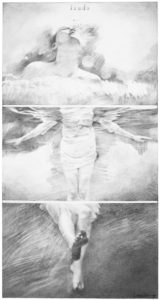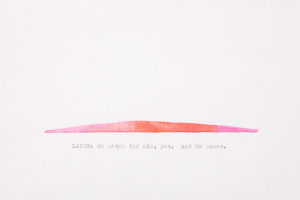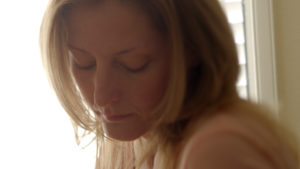The Hour of Lauds: The sun returns. The sleeper awakes.
August 3, 2021
This is the second in a series of eight reflections on the Hours of prayer, focusing on Lauds, the break of day. This series is to celebrate the release of the Praying the Hours soundtrack by Lolo Meares. An excerpt from the soundtrack starts the post so that you can have her sonic imagination of the personality of this triumphant Hour in your mind as you read. (A link to the album can be found at the bottom of this essay, along with a link to the book Praying the Hours in Ordinary Life from which the essay comes.)
The light returns.
This Hour is one of two most easily identified by the movement of celestial light. Sunrise and sunset—Lauds and Vespers—are called hinge Hours, because they are transitions between dark and light. Their separation defined the world’s first and therefore iconic drama. The Hour of Lauds marks the time from the sky’s first lightening to the sun’s release into the sky from the horizon. The light changes quickly, radically, to throw a pale, clean, hopeful hue on the world. Joy replaces mourning at this Hour, according to the Scriptures.
The personality of Lauds is to be found in all things naked and new. It is a time of relief, of celebration, liveliness, and, as Paul urges the Corinthians in his first letter to them, an Hour to follow after love. “The Morning Office” is one of the most ancient offices and can be traced back to apostolic times in the sixth century.
Not all dawns bring joy, however, and those who suffer in the night hours are often wary of dawn. They bury their heads under the false night of a pillow or blanket, not simply tired but exhausted by Vigils well over one night long, and full of pain. What kind of Lauds awaits King David, after a sleepless night: “I rise before dawn and cry for help; I put my hope in your words. My eyes are awake before each watch of the night, that I may meditate on your promise” (Psalm 119:147–48). As with each Hour, the citizen of Lauds faces the sometimes brutal conflict between dreams and reality, voicing the ubiquitous surprise that “things didn’t turn out the way I expected them to.” What does it cost to face the challenge of Lauds for the woman who dreams of family and wakes alone? Will she choose love when she can no longer imagine its shape? To be found naked at Lauds may mean revealing a life like a hard crust of bread rather than the scent of orange blossoms. So this hour is also a soul-hinge, shifting from darkness into light when often only the darkness can be imagined.
Spanish poet Juan Ramón Jiménez wrote the simple lines: “My boat struck something deep. And nothing changed, and everything has changed. And here I sit in the middle of my new life.” This is a Lauds prayer. What is, is. What is not, is not. New and not new, this sleepy, achy Hour is where God meets us with tender urgings toward courage. We must be led into the light by the Spirit who knows and sees things hidden to us, for sorrow is always easier to anticipate than joy. Joy is the Spirit’s surprise, delivered through the humblest of messengers, impossible to imagine or control. How can a season of heartache be relieved—even temporarily—by the random sight of a hummingbird? The sound of a child’s singing voice? A genuine soul-laugh or a scent that excavates a deeply treasured memory?
It is impossible to plan on a breeze lightening relentless sorrow or depression, and yet it happens. God must glory in these astonishing victories of the poignant over the crushing, because it is God’s unique device. A holocaust survivor tells of concentration camp misery being relieved by the song of a morning bird. A mother keeping watch at the children’s hospital is given hope by the smile of a sick child. Rage is turned aside by a soft word. Such tender mercies are potent because they are reminders of God’s presence in our days, God’s intimacy. The Lover of our Souls watches over us in the night, as promised, guiding us through dreams we’ve been given, and bringing us safely to wakefulness each morning with the promise of company. The same troubled King David who struggled through the night watches determined, “O Lord, in the morning you hear my voice; in the morning I plead my case to you, and watch” (Psalm 5:3). We watch for God, yes. And God comes.
Gott spricht zu jedem nur, eh er ihn macht
God speaks to every person before He makes him,
then silently walks with him out of the night.
Those words before anyone comes into being,
those cloudy words are:
Follow your senses.
Go to the limits of your longing.
Embody me.
Behind everything shall rise a flame
so that its shadow is great enough to hide me.
Let everything happen to you: beauty and terror.
Just keep moving. No emotion should be too far-fetched.
Do not separate from me.
Nearby is the land they call life.
You will know it by its sincerity.
Give me your hand.
—Rainer Maria Rilke, The Book of Hours, I, 59
translated by Martina Nagel

Denise Louise Klitsie’s imagination of the Hour of Lauds imagines the sleeper rising from sleep into the light (from Praying the Hours in Ordinary Life)
Excerpt on Lauds from Praying the Hours in Ordinary Life by Lauralee Farrer and Clayton J. Schmit, Wipf and Stock, 2010, used with permission and found here. Excerpt from the album on Lauds, from the Praying the Hours soundtrack by Lolo Meares—with artwork by Lori Fox—can be freely streamed or purchased here.
*This Just In:Thank you Dave, Tom and Jane, whose gifts of friendship over the years have been many and diverse. Adding your considerable contributions to give Praying the Hours a wider release is both humbling and exciting. Thank you. (If you want to see the film or receive updates, write to info@burningheartproductions.com. To contribute to its release, go here.)



